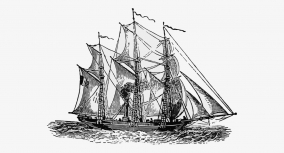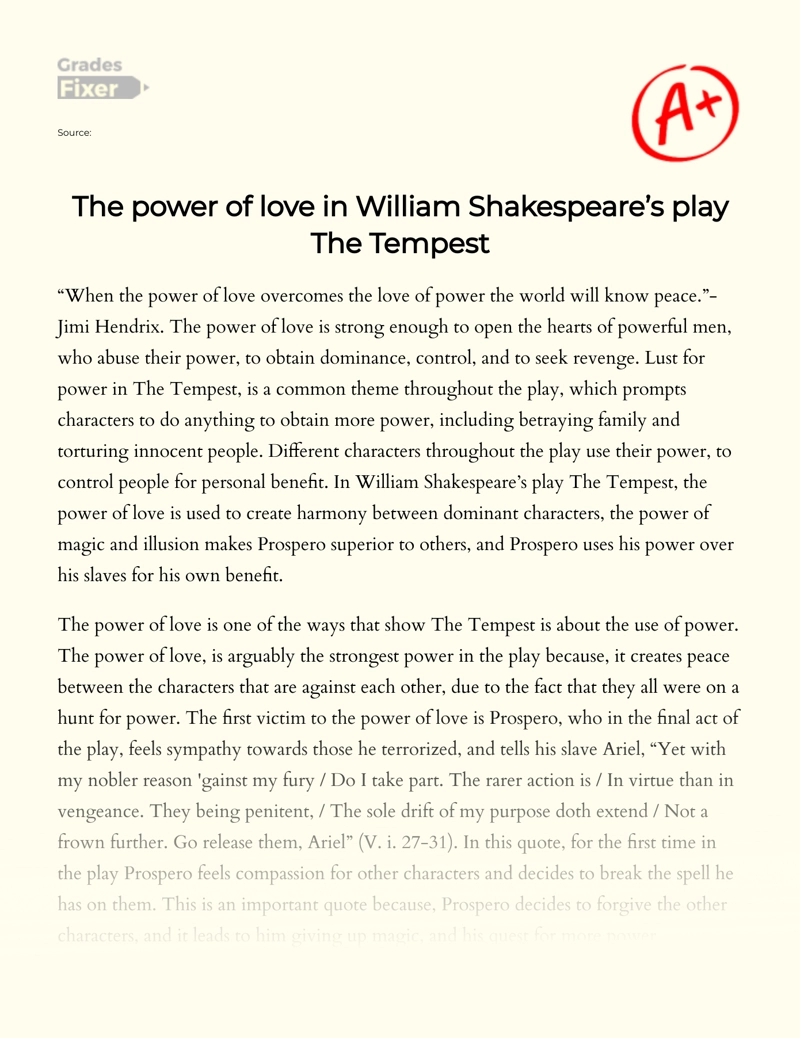Power in Macbeth
This essay will explore the theme of power in Shakespeare’s “Macbeth.” It will analyze how the pursuit of power influences the characters, particularly Macbeth and Lady Macbeth, and leads to their moral decay and downfall. The piece will examine the play’s exploration of ambition, guilt, and the corrupting nature of power. Additionally, PapersOwl presents more free essays samples linked to Macbeth.
How it works
Macbeth’s underlining theme is power. Power means different things for different people. How people react to power varies by how you attain power, retain power, and ultimately lose power. Power can lead someone to ambiton and make them vulnerable. What motivates the person with power, shows their true selves. Once someone has power they may be suprised at what they are willing to do to keep it.
Vulnerability and ambition are characteristics of someone in power. Macbeth was a loyal warrior and friend of Duncan the king of Scotland.
Although Duncan was a fair and trusting king, it made him vulnerable. Macbeth struggles with his choice to kill Duncan for his own good because he’s related and loyal to him. He should be protecting him from harm versus being the one ready to cause the harm. Duncan is so well-liked and such a good king that when he’s gone, he will still be remembered for his great legacy (Shakespeare Act 1, Scene 7, 13-18). Macbeth was happy being a successful warrior for his country and content from receiving a new title granted to him by the king for his good service. Had it not been for his encounter with the witches, who suggested that one day he could be king, the seed of ambition wouldn’t have been planted. Macbeth struggles with the thought of having to kill someone he admires to fulfill his ambition. Macbeth is finding it hard to motivate himself to do such a deed and realizes that ambition is a foolish reason for doing it (Act 1, Scene 7, 28). When Macbeth told Lady Macbeth about what the witches prophesied she immediately wanted to convince him that he should follow through with what he wants. She believes he’s not strong enough to commit a crime for the sake of becoming king (Act 1, Scene 5, 22-25). After Duncan’s murder, his sons fled the scene for their own safety. They should be the next in line to become king but feel vulnerable since they do not know who wanted their father killed. The sons feel its best to quickly leave before they encouter any danger (Act 2, Scene 3, 134-138).
Once power is achieved, how that power is used is another story. People can be powerful even if they are not a person in power. Lady Macbeth is powerful in the way she can control Macbeth. She is the force behind Macbeth’s path to being king and is excited to be in the position of being the wife of the king and power that comes with it. Lady Macbeth also references to the wine she drank the night of Duncan’s murder. She reveals that the wine made her arrogant and bold fueling her sense of power. That with hath made them drink hath made me bold; what hath quenched them hath given me fire (Act 2, Scene 2, 1-2). Now that Macbeth has been made king, he is constantly worried about keeping his throne position and goes on a killing spree to eliminate anyone who he thinks is a threat to him. Things bad begun make strong themselves by ill (Act 3, Scene 2, 54). Banquo is not a leader but is given power once the witches prophesied that his sons would be kings. Macbeth fears that Banquo and his sons are a threat to his throne and is compelled to eliminate them. Macbeth feels that he’s not safe and questions the point of being king? He’s very fearful of Banquo because he’s noble, smart, brave, and is carefully cunning (Act 3, Scene 1, 48-54). Macbeth decides not to leave fate to chance and would rather fight to the death than be pushed off his throne (Act 3, Scene 1, 70-71). His fear leads him no choice but to kill Banquo and his son Fleance. Powerful people use a variety of methods to gain and maintain their power. Some resort to evil while others use more acceptable means of getting what they want.
When powerful people take action, its often a reaction to someone else’s action. It could be a desperate attempt for protection or could be a necessary evil to make things right. For instance, Duncan’s son Malcolm had to flee the scene of his father’s murder to protect himself. While in hiding, he created an army to help him fight for his rightful place as king and to save his country. Macduff went to see Malcolm to inform him of the dire situation Scotland is in because of Macbeth’s rule. Malcolm assures him that he is aware of the situation and has thousands of soldiers ready for battle. They will fight together and hopefully be successful in their cause (Act 4, Scene 3, 134-137). Macbeth has the country in a state of turmoil in his greed to retain his crown. In desperation, he seeks out the witches to know his future. His insecurity allows for the witches to trick him into a false sense of security. Macduff is not a leader, however, is given a motive for revenge against Macbeth for killing his family. Macduff is loyal to Scotland and wants to save it. To do so, he will tap into Malcolm’s position of power as an opportunity for his revenge. With the witches help, Macduff is successful in his quest. Be bloody, bold, and resolute. Laugh to scorn The power of man, for none of woman born Shall harm Macbeth (Act 4, Scene 1, 80-81). Macbeth faces battle feeling invincible until he sees the signs, the apparations warned him about of luring him to his death.
The play has a lot to say about power, the desire of power, and the method of how power is used. Power exemplifes a person’s character and changes their life. Its brings out the good, the bad, and the ugly out of people. Power can be tempting when you don’t have it. Lust for power has been responsible for many terrible events. It is human nature to be driven, however power has to be controlled. True leaders use their power for the good of all, not only for their own satisfaction.

Cite this page
Power In Macbeth. (2019, Jun 13). Retrieved from https://papersowl.com/examples/power-in-macbeth/
"Power In Macbeth." PapersOwl.com , 13 Jun 2019, https://papersowl.com/examples/power-in-macbeth/
PapersOwl.com. (2019). Power In Macbeth . [Online]. Available at: https://papersowl.com/examples/power-in-macbeth/ [Accessed: 3 May. 2024]
"Power In Macbeth." PapersOwl.com, Jun 13, 2019. Accessed May 3, 2024. https://papersowl.com/examples/power-in-macbeth/
"Power In Macbeth," PapersOwl.com , 13-Jun-2019. [Online]. Available: https://papersowl.com/examples/power-in-macbeth/. [Accessed: 3-May-2024]
PapersOwl.com. (2019). Power In Macbeth . [Online]. Available at: https://papersowl.com/examples/power-in-macbeth/ [Accessed: 3-May-2024]
Don't let plagiarism ruin your grade
Hire a writer to get a unique paper crafted to your needs.

Our writers will help you fix any mistakes and get an A+!
Please check your inbox.
You can order an original essay written according to your instructions.
Trusted by over 1 million students worldwide
1. Tell Us Your Requirements
2. Pick your perfect writer
3. Get Your Paper and Pay
Hi! I'm Amy, your personal assistant!
Don't know where to start? Give me your paper requirements and I connect you to an academic expert.
short deadlines
100% Plagiarism-Free
Certified writers
The Tempest Themes
Shakespeare tends to focus on very specific issues in each of his masterpieces. In The Tempest , the themes of power and magic are the dominant ones. However, a little bit of attention is also drawn to the topic of colonization .
Our specialists will write a custom essay specially for you!
Looking for The Tempest themes? Find them all described here! This article prepared by Custom-Writing.org experts contains descriptions and analysis of the key themes in The Tempest . If you wish to dive deeper into the world of this play and understand the underlying issues, this section is for you!

- ⛓️ Colonialism
🔗 References
💪 power in the tempest.
It seems like almost every scene goes back to the questions about power in The Tempest . Even in the opening scene, the audience has the pleasure of observing the boatswain commanding the royal party, who are the passengers. Moreover, an exciting aspect of this play is that power is taken by force in most cases. As it would be anticipated, it leads to even more instability in the relationships and the vicious cycle of desiring even more. One of the best examples is how Antonio and Alonso betray Prospero. It is an immensely political problem, which yet shows that no illegal manipulation with authority can be left in the past. Later on, it leads to Antonio wishing for more power and attempting to murder the king. At the same time, the audience sees that this time his attempt fails. Therefore, it proves that violence is not a universally successful tool when it comes to gaining power.
Another relationship based on gaining power in The Tempest is Prospero and Caliban. After Prospero takes over the island with magic, Caliban swears for revenge and wants his rights and freedom back. However, the culmination of this theme in The Tempest appears to be the moment when the main character decides not to keep going with the vicious cycle. The fact that Prospero refused to seek revenge on Antonio influenced other a lot. They all come to peace and understanding at the end. Shakespeare’s main message regarding this theme is that compromise and forgiveness are a much better tool for settling things down than violence.
The Tempest Quotes about Power
Had I been any god of power, I would Have sunk the sea within the earth or ere It should the good ship so have swallow’d and The fraughting souls within her. The Tempest act 1, scene 2
I must obey: his art is of such power, It would control my dam’s god, Setebos, and make a vassal of him. The Tempest act 1, scene 2
His mother was a witch, and one so strong That could control the moon, make flows and ebbs, And deal in her command without her power. The Tempest act 5, scene 2
💫 Magic in The Tempest
In The Tempest , magic is one of the main themes. Supernatural elements are not uncommon in Shakespeare’s works , but this piece is full of magic manipulations. Prospero is the character who applies magic almost all the time. The first scene begins with him using it, and the play ends with him using it for the last time. However, it should be noted that a lot of times, he puts on illusions that do not harm his enemies except for psychologically related troubles. At the same time, Prospero possesses almost total control over the events and people on the island. Thanks to the spirit, he knows what is happening everywhere and can think through his next moves.
There is a certain resemblance between the way Prospero alters reality with magic in The Tempest and how the author does the same with words. Many times, Prospero is found peaking from the hiding at some of the scenes, just like the director manages the action. This is quite symbolic , and there have been a lot of assumptions made about these kinds of comparisons. One of the suggestions is that Prospero appears on the scene of the play as Shakespeare himself . It makes sense if we look into the last part of this literary piece. In the epilogue, Prospero asks the audience to set him free by applauding. It wouldn’t be so significant if this play wasn’t one of the last ones that Shakespeare wrote. Such an epilogue might be the way of saying goodbye to the theater. Therefore, as one of the main themes of The Tempest , magic has interpretations.
Just in 1 hour! We will write you a plagiarism-free paper in hardly more than 1 hour
The Tempest Quotes about Magic
My master through his art foresees the danger That you, his friend, are in; and sends me forth– For else his project dies–to keep them living. The Tempest act 2, scene 1
But this rough magic I here abjure, and, when I have required Some heavenly music, which even now I do, To work mine end upon their senses that This airy charm is for, I’ll break my staff, Bury it certain fathoms in the earth, And deeper than did ever plummet sound I’ll drown my book. The Tempest act 5, scene 1
Now my charms are all o’erthrown, And what strength I have’s mine own, Which is most faint: now, ’tis true, I must be here confined by you The Tempest Epilogue
⛓️ Colonialism in The Tempest
Colonization in The Tempest appears to be quite a fascinating subject. At least it was exciting for the readers during the time when the play was written. The attempts of colonizing distant lands attracted a lot of attention. In The Tempest , colonialism as a theme is opened up through the complex relationships between Prospero and Caliban. Prospero sees an uneducated islander as less of a human than himself and expects him to be grateful for teaching. However, it has never occurred to him that Caliban might be the rightful ruler of the island because such a savage cannot possibly perform such a complicated role. In return, Caliban understands that Prospero doesn’t respect him at all and traits him as a slave. Finally, it leads the islander to realize that he gave up the ruler’s position for nothing. Naturally, such an unfair situation evokes anger and violence in Caliban, making Prospero even more convinced in the savage nature of his protégé. It perfectly illustrates the relationship between the native people and the colonizers when every little misunderstanding leads to violent conflicts.
Moreover, Shakespeare explores the fears related to the theme of colonialism and slavery in The Tempest . For example, it is evident that people can hardly tolerate the marriage of a king’s daughter and an African. Another situation pointing out colonization and slavery issues is when both Trinculo and Stephano see an opportunity to capture Caliban and make money on him back home. On the other hand, colonization offers the chance to build perfect contemporary societies, just like Gonzalo dreams about.
The Tempest Colonialism Quotes
Thou most lying slave, Whom stripes may move, not kindness! I have used thee, Filth as thou art, with human care, and lodged thee In mine own cell, till thou didst seek to violate The honour of my child. The Tempest act 1, scene 2
You taught me language; and my profit on’t Is, I know how to curse. The red plague rid you For learning me your language! The Tempest act 1, scene 2
This island’s mine, by Sycorax my mother, Which thou takest from me. When thou camest first, Thou strokedst me and madest much of me, wouldst give me Water with berries in’t, and teach me how To name the bigger light, and how the less, That burn by day and night: and then I loved thee And show’d thee all the qualities o’ the isle, The fresh springs, brine-pits, barren place and fertile: Cursed be I that did so! The Tempest act 1, scene 2
Thank you for reading this article! If you need more information about literary themes, check the article about themes in literature . You might also want to take a look at The Tempest essay topics collection . And if you need to make the text of your essay more colorful, try our paraphrasing tool . Any questions left? Check The Tempest QA section !
- ‘The Tempest’ Themes, Symbols, and Literary Devices
- A Guide to Power Relationships in “The Tempest” – ThoughtCo
- The Meaning of Magic in Shakespeare’s The Tempest – Medium
- Shakespeare’s Tempest and the Discourse of Colonialism – jstor
- Post-colonial reading of The Tempest – The British Library
- Share to Facebook
- Share to Twitter
- Share to LinkedIn
- Share to email

The Tempest is one of the most beloved plays written by Shakespeare. The story is about the duke of Milan who had to escape to an island. Prospero uses magic to revenge his brother for betrayal and takes control over the royal party for that. If it sounds intriguing, you...

The Tempest is a unique and beautiful play that focuses on love and forgiveness at the crossroad of betrayal and magic. The main actions happen on a small island somewhere near Italy. The ship crushes there after a storm. An old magician Prospero and his daughter, Miranda, who live there...

Looking for The Tempest characters? Find them all analyzed here! This article by Custom-Writing.org experts contains character descriptions and analysis of Prospero, Miranda, Alonso, and other characters, as well as The Tempest character map. 🗺️ The Tempest Character Map Below you’ll find The Tempest character map. It contains all the...

In case you are one of those who love getting into details or just a student who needs help with literature assignments, The Tempest analysis section prepared by Custom-Writing.org experts is what you need. Here, we discuss The Tempest genre and some details about the setting. There is also the...

Students’ life is a bumpy ride, and sometimes you can end up with several vital assignments all of which are due the next day. Custom-Writing.org experts have prepared a compilation of The Tempest essay topics. On this page, you’ll find best questions, prompts, title ideas on the Shakespeare’s play, together...

Have you already looked through our complete guide and still have questions? It’s not always easy to grasp the deep meaning of one topic or another just after reading someone else’s opinion. Or do you have an upcoming assignment on Shakespeare’s The Tempest? This section is the best way to...

In The Tempest, Caliban is the local half-monster who was unfortunate enough to become a slave. Prospero was trying to civilize him by giving language lessons. However, the only thing Caliban actually wants is freedom and his rightful land. He even plots against his master, but the murder plan never...

Tempest means a violent and intense storm. It is somewhat significant that The Tempest by Shakespeare opens up with the storm that carries the boat to the island. However, the detailed analysis of the plot and the characters reveals that the title is mainly related to the turmoil of emotions...

In Shakespeare’s play, Miranda is described as an innocent and empathetic girl. She is a relatively passive character and the only female character in The Tempest. She may seem quite naïve and helpless to the audience, but a few scenes can prove them wrong. She transcends her traditional gender role...

When Caliban finds new friends, Stephano and Trinculo, he asks them to help him with the assassination of his master. They plot to take away Prospero’s books to disarm him and kill him when he is taking a nap. To motivate his fellows, he promises that they would get control...

In Shakespeare’s play, Caliban is ultimately seen as Prospero’s slave. Their relationship highlights one of the central themes of The Tempest concerning colonialism and imperialism. He is the only native inhabitant on the island and is not treated well by his master. Caliban wishes ill to Prospero and wants to...

Shakespeare’s play includes characters of different levels of power. However, since the latter is one of the key play’s literary themes, the division between them is pretty straightforward. The characters who use magic are way more potent than the ones that don’t. Moreover, Prospero is considered to be in control...

There are many lines in The Tempest that Shakespeare wrote in iambic pentameter, so it is hard to pick only one. As an example, the line where Miranda says, “O brave new world,” is perhaps the most famous one. Mostly, the noble characters speak in verse while the others use...

Prospero is the main character of Shakespeare’s play, The Tempest. He was betrayed by his brother and had to seek another home. A remote island appeared to be a nice place, so Prospero and his daughter settled there. Over the years, he has been planning revenge with the help of...

In the play, Prospero is presented as a magician who gets his fantastic powers from the books. There are a lot of things that he managed to achieve thanks to that power. However, by the end of The Tempest, Prospero swears to throw away all his books and put an...

In Shakespeare’s play, Ariel is portrayed as a magical spirit under Prospero’s control. Throughout the whole play, he has to complete different tasks the magician gives him. Every time Ariel hopes that it would be the last one, but he doesn’t get his freedom back until the end of The...

Caliban and Ariel live on the remote island which Prospero claimed and took under his control. Both characters of The Tempest have a similar fate since the magician forced them both to serve him. However, the significant difference between them is that Caliban is not treated as respectfully as Ariel....

There seem to be too many things that Prospero does, showing how manipulative he is. The character possessing such a power uses it to alter the events in the play and force others to obey. However, one of his actions shows it most clearly. Prospero uses magic to put his...

Alonso is the king of Naples in the play. Together with the members of the royal party, he gets into the storm and ends up on an unknown island. It appears to be a pretty tragic occurrence since his son, Ferdinand, goes missing. By the end of the play, Alonso...

Caliban is the only islander found by Prospero and Miranda in the play. Even though he shows quite a negative attitude towards other characters throughout the whole story, there is something positive in him. Caliban loves his homeland, and he is ready to share all the knowledge he has about...

It is believed that Shakespeare created his masterpiece in 1610 or 1611. However, it is hard to judge which data is correct. The evidence shows that the first performance of The Tempest was in November 1611. Moreover, it appears to be one of the last plays ever written by Shakespeare....

In the original play, Ariel is a spirit that was trapped on the island. When Prospero freed him, he made Ariel his servant in return. Therefore, throughout The Tempest, the spirit has to attend to the magician’s wishes. In the Balinese production, Ariel resembles an animal and flies around instead...

Gonzalo is a member of the royal party who appears to be on the boat with the others. He is the king’s counselor and the one who is worried about Alonso the most. Throughout the play, he tries to do everything to help the king and protect him from the...

Shakespeare included the themes of colonialism and imperialism in The Tempest for a reason. Moreover, they are most clearly represented through Prospero and Caliban’s relationship in the play. Prospero is pictured as a typical colonizer who doesn’t respect the locals and only wants to take over the land for personal...

It may not appear obvious, but there is an example of linguistic imperialism in Shakespeare’s The Tempest. Prospero and Caliban have a pretty complicated relationship which reflects a typical situation between the colonizer and the locals at the time. It results in the unpleasant occurrence of language barrier and misunderstanding,...

Usually, Shakespeare’s The Tempest is classified as a comedy. There are all the aspects pointing out at it, such as humorous situations and many misunderstandings that end up being clarified. A happy celebration of marriage at the end also aligns with it. However, some of the play’s scenes include tragic...

Among the different productions of Shakespeare’s The Tempest, there are some that can be clearly considered an interpretation. For example, the audience would know that the one in which Prospero shows sympathy to Caliban is far from the original. The magician doesn’t actually act as fair and kind towards his...

Shakespeare’s The Tempest is generally considered a comedy. The plot is based on a series of misunderstandings that turn out to be comic by the end of the play. Moreover, no one dies, even though some of the characters get lost or upset. However, there are some small elements of...

In both the Utah Valley University and Balinese productions, several characters from the play are pictured very similarly. The interpretations of Prospero, Caliban, and Ariel appear to be the same in both perceptions. The main character is shown as a powerful magician who made the islander and the spirit his...

Many important characters in The Tempest appear in the first scene of the play. Sebastian is one of them. It already seems like he and Antonio are up to something, but the audience remains clueless until the play ends. Sebastian is the king’s brother who attempts a murder later on....

Caliban is not presented as the most pleasant character of The Tempest. While Prospero rules over him, Miranda is simply afraid of the islander. Indeed, he is portrayed as an angry, uneducated, and untidy man. The girl feels threatened by him and tries to stay away from him as much...

Shakespeare’s The Tempest raises a few quite important and relevant literary themes. One of them is colonization. It was a popular topic back then, and its main issues are well represented in the play. However, power may be considered the central theme in The Tempest and goes throughout the whole...

Even though Shakespeare’s The Tempest is considered to be a comedy and maybe a romance, there are some elements of a tragedy. It is especially noticeable in the first two acts. Some of the events just don’t align with the standard genre categorization of this play. One of them is...

Shakespeare seems to have a very definite view on colonization which is reflected in The Tempest. All the issues that Prospero has with Caliban, the native to the island, prove the main idea of the play. Unfortunately, Caliban is treated like a handicapped monster by almost every character. There are...
- PRO Courses Guides New Tech Help Pro Expert Videos About wikiHow Pro Upgrade Sign In
- EDIT Edit this Article
- EXPLORE Tech Help Pro About Us Random Article Quizzes Request a New Article Community Dashboard This Or That Game Popular Categories Arts and Entertainment Artwork Books Movies Computers and Electronics Computers Phone Skills Technology Hacks Health Men's Health Mental Health Women's Health Relationships Dating Love Relationship Issues Hobbies and Crafts Crafts Drawing Games Education & Communication Communication Skills Personal Development Studying Personal Care and Style Fashion Hair Care Personal Hygiene Youth Personal Care School Stuff Dating All Categories Arts and Entertainment Finance and Business Home and Garden Relationship Quizzes Cars & Other Vehicles Food and Entertaining Personal Care and Style Sports and Fitness Computers and Electronics Health Pets and Animals Travel Education & Communication Hobbies and Crafts Philosophy and Religion Work World Family Life Holidays and Traditions Relationships Youth
- Browse Articles
- Learn Something New
- Quizzes Hot
- This Or That Game
- Train Your Brain
- Explore More
- Support wikiHow
- About wikiHow
- Log in / Sign up
- Education and Communications
- College University and Postgraduate
- Academic Writing
How to Write a Theme Essay
Last Updated: January 4, 2024 Fact Checked
This article was co-authored by Jake Adams . Jake Adams is an academic tutor and the owner of Simplifi EDU, a Santa Monica, California based online tutoring business offering learning resources and online tutors for academic subjects K-College, SAT & ACT prep, and college admissions applications. With over 14 years of professional tutoring experience, Jake is dedicated to providing his clients the very best online tutoring experience and access to a network of excellent undergraduate and graduate-level tutors from top colleges all over the nation. Jake holds a BS in International Business and Marketing from Pepperdine University. There are 9 references cited in this article, which can be found at the bottom of the page. This article has been fact-checked, ensuring the accuracy of any cited facts and confirming the authority of its sources. This article has been viewed 206,821 times.
Starting the Essay

- For example, an essay prompt may ask you to reflect on the theme of good versus evil in John Steinbeck's East of Eden .

- Make a list of everything you know about the topic. This can be information you learned in class, as well as information you found on your own.
- Write down keywords or key scenes in the text that respond to the essay prompt. Think about what words or scenes from the text come to mind when you think of a specific theme.
- For example, when you brainstorm ideas on East of Eden , you may write down any moments in the text that seem to speak to the theme of good and evil.

- Your thesis statement will need to address the theme, your primary example or examples, and the stance you will take on the topic.
- For example, your thesis might be: "In East of Eden , John Steinbeck rejects the Biblical idea of good and evil and instead focuses on the contradictions and complications found in good and evil."

- Introduction: Discuss landscape as metaphor, include thesis statement.
- Body: Describe mountains in opening scene, elaborate on how they symbolize good vs. evil, state how characters live between the mountains, showing how people are caught between good and evil.
- Conclusion: Restate thesis statement, return to landscape as metaphor.
Writing Your Essay

- Questions can make fun hooks for the reader. Ask a rhetorical question that relates to the theme of the essay, such as "How does one decide what is good and what is evil?"
- You can also use a quote from the text as the hook. Find a quote in the text that explores the themes and ideas you'll be discussing in your essay.

- For example, you may introduce the role of nature plays in the text to discuss the theme of good and evil. The first sentence of your body paragraph should discuss the role of nature. This will set up the paragraph and let the reader know what the focus of the paragraph will be.

- For example, you may discuss the use of nature in the text in one paragraph. The body of the paragraph should then use quotes and scenes in the text to support this idea.
- You might write,"The descriptions of the Gabilan Mountains in the text symbolize good and evil. The characters in the story live in the Salinas Valley, trapped in a gray area between these two extremes."

- Ask yourself, "What do I want my readers to have learned through this essay?"
- Remind readers about the essay's theme. Reference some of the arguments you made in the body of your essay, reinforcing how they support your original point.
Revising Your Essay

- Check that there are transitions between paragraphs. Look at the beginning of each paragraph to make sure they all flow well together.

- Print out your paper and proofread it. Oftentimes, errors are easier to catch on paper. If you can't print out your paper, try changing the size or type of the font. Anything that alters how the work looked when you wrote it can help alert you to errors. [13] X Trustworthy Source University of North Carolina Writing Center UNC's on-campus and online instructional service that provides assistance to students, faculty, and others during the writing process Go to source

- Be open to constructive feedback from friends and peers. This will only improve the essay and ensure it is at its best when you turn it in.
Expert Q&A

You Might Also Like

- ↑ Jake Adams. Academic Tutor & Test Prep Specialist. Expert Interview. 20 May 2020.
- ↑ https://penandthepad.com/write-essay-theme-book-2200.html
- ↑ https://wts.indiana.edu/writing-guides/how-to-write-a-thesis-statement.html
- ↑ https://www.grammarly.com/blog/essay-outline/
- ↑ https://www.grammarly.com/blog/how-to-write-a-hook/
- ↑ https://libguides.newcastle.edu.au/how-to-write-an-essay/conclusion
- ↑ https://owl.purdue.edu/owl/general_writing/the_writing_process/proofreading/steps_for_revising.html
- ↑ https://owl.purdue.edu/owl/general_writing/the_writing_process/proofreading/proofreading_suggestions.html
- ↑ https://writingcenter.unc.edu/tips-and-tools/editing-and-proofreading/
About This Article

When writing a theme essay, you’ll need to explore a given theme in the text you’re studying. Before you start your essay, brainstorm some notes about your theme, which you can then build your essay from. For example, if you have the theme of good and evil, think about which characters are mostly good or evil, any good or evil actions they take, description that uses light and darkness, and any religious context. In your intro, state your thesis, which should summarize your essay’s main argument. Then, choose 4 or 5 examples of your theme and write a paragraph exploring each one. Make sure you support your points with quotes from the text. In your conclusion, link your ideas back to your thesis statement. For more tips from our English co-author, including how to revise your essay to polish it up, read on! Did this summary help you? Yes No
- Send fan mail to authors
Reader Success Stories
Mar 13, 2018
Did this article help you?

Jul 29, 2017
Dec 18, 2016
Nov 8, 2016
Ashley Ding
Nov 22, 2016

Featured Articles

Trending Articles

Watch Articles

- Terms of Use
- Privacy Policy
- Do Not Sell or Share My Info
- Not Selling Info
Get all the best how-tos!
Sign up for wikiHow's weekly email newsletter
Home — Essay Samples — Literature — The Tempest — The Power of Love in William Shakespeare’s Play the Tempest
The Power of Love in William Shakespeare’s Play The Tempest
- Categories: The Tempest William Shakespeare
About this sample

Words: 654 |
Published: Mar 28, 2019
Words: 654 | Page: 1 | 4 min read

Cite this Essay
Let us write you an essay from scratch
- 450+ experts on 30 subjects ready to help
- Custom essay delivered in as few as 3 hours
Get high-quality help

Prof. Kifaru
Verified writer
- Expert in: Literature

+ 120 experts online
By clicking “Check Writers’ Offers”, you agree to our terms of service and privacy policy . We’ll occasionally send you promo and account related email
No need to pay just yet!
Related Essays
3.5 pages / 1676 words
7 pages / 3276 words
6.5 pages / 3030 words
7 pages / 3092 words
Remember! This is just a sample.
You can get your custom paper by one of our expert writers.
121 writers online

Still can’t find what you need?
Browse our vast selection of original essay samples, each expertly formatted and styled
Related Essays on The Tempest
There are a number of dramas and other stories that have been written over time and each one of these have their significant position in literature. These stories and plays not only have a great story but there is also [...]
The relationship between Prospero and Ariel is a curious one. Firstly, their names have interesting connotations. Prospero brings to mind the verb ‘to prosper’ – suggestive of magic and conjuring, while Ariel, described as an [...]
How is Caliban presented in "The Tempest" by William Shakespeare? This essay will discover Shakespeare's portrayal of Caliban as that of a savage beast and a slave of the witch, Prospero. Caliban is the son of [...]
In the novel Nineteen Eighty-Four, Orwell uses several literary techniques to develop the theme that totalitarianism is destructive. He does so by using extensive imagery, focusing on the deterioration of the Victory Mansions, [...]
Romantic love and intimacy are common features in 1984 by George Orwell. The Party works to eradicate all physical sensations of love and depersonalise sex to the point where is it referred to as a 'duty to the party' for the [...]
The fear of a dystopian future that is explored in both Fritz Lang’s film Metropolis and George Orwell’s novel Nineteen Eighty Four is reflective of the values of the societies at the time and the context of the authors. As [...]
Related Topics
By clicking “Send”, you agree to our Terms of service and Privacy statement . We will occasionally send you account related emails.
Where do you want us to send this sample?
By clicking “Continue”, you agree to our terms of service and privacy policy.
Be careful. This essay is not unique
This essay was donated by a student and is likely to have been used and submitted before
Download this Sample
Free samples may contain mistakes and not unique parts
Sorry, we could not paraphrase this essay. Our professional writers can rewrite it and get you a unique paper.
Please check your inbox.
We can write you a custom essay that will follow your exact instructions and meet the deadlines. Let's fix your grades together!
Get Your Personalized Essay in 3 Hours or Less!
We use cookies to personalyze your web-site experience. By continuing we’ll assume you board with our cookie policy .
- Instructions Followed To The Letter
- Deadlines Met At Every Stage
- Unique And Plagiarism Free
Home Essay Examples Literature Macbeth Power
The Theme Of Power In Macbeth
- Category Literature
- Subcategory Poems
- Topic Macbeth Power

This essay is about how Shakespeare explores the theme of power throughout the play. Macbeth is portrayed as ambitious yet vulnerable because he couldn’t keep his drive for power in control. As a result, it ultimately leads to his family’s and his own death.
Macbeth’s ambitions cause him to lose his conscience and we know this when he describes himself to “have no spur To prick the sides of my intent, but only vaulting ambition, which overleaps itself and falls on th’ other’. The metaphor ‘vaulting ambition’ suggests he has an intense desire for power and reaches the conclusion that he has a lack of motivation, but the only thing driving him present is ambition (which is compared to as a ‘vaulting ambition’). The phrase “no spur” suggests that Macbeth has no reasonable justification to murder Duncan but it’s his ambition that wins over his conscience and it ends up being his weakness. Also, the phrase “and falls on the other side” compares him to an inexperienced horse rider who vaults so vigorously and ends up falling to the ground; this phrase tells us he is foreseeing that it’ll be a serious mistake to murder the king. We associate power and ambition with positive outcomes and achievements, but it can all backfire if you don’t keep your drive for power in control, Macbeth didn’t.
Our writers can write you a new plagiarism-free essay on any topic
Macbeth is first presented as a powerful figure from when the witches say “All hail, Macbeth, thou shalt be king hereafter!…So all hail Macbeth and Banquo”. The verb “hail” means to welcome or praise enthusiastically so this suggests to the audience that he is praiseworthy. “though shalt be king hereafter” means that Macbeth will be future king, after becoming thane of Glamis and thane of Cawdor which is predicted by the 3 witches. The prophecy also claims that Banquo won’t be king, but his descendants will, which angers Macbeth. The audience sense that Macbeth and Banquo are strong, ambitious figures who want the power to accomplish things.
Lady Macbeth is deemed as sly and deceitful from when she gets a letter from Macbeth and learns about the witches and the prophecies. She says to herself “though wouldst be great art not without ambition, but without the illness to attend it”. The word “illness” means to have a disease but in this context, it suggests that the illness is ruthlessness and having the ability to kill the king. Lady Macbeth suggests her husband is a great, ambitious man, but he lacks the character traits to take the crown for himself. She knows he is too good of a person so she must influence him and plan out how to kill the king. Plus, the word “holily” (mentioned later on), indicates that Macbeth wants to be a good man, but he wants something that doesn’t belong to him.
To sum up the play, Macbeth is consumed with ambition and influence and murders King Duncan to take the Scottish crown for himself; however, he is hit with guilt and fear and eventually ends up being brutally murdered by Macbeth. Shakespeare wrote this play as a tribute to King James and wanted to include topics such as witchcraft, power and ancestry. Shakespeare also may have written Macbeth to support the natural order of events, which if disturbed, would inevitably lead to disaster.
We have 98 writers available online to start working on your essay just NOW!
Related Topics
Related essays.
By clicking "Send essay" you agree to our Terms of service and Privacy statement . We will occasionally send you account related emails.
By clicking "Receive essay" you agree to our Terms of service and Privacy statement . We will occasionally send you account related emails.
We can edit this one and make it plagiarism-free in no time
We use cookies to give you the best experience possible. By continuing we’ll assume you board with our cookie policy .

Naomi Alderman
Ask litcharts ai: the answer to your questions.
Power and Violence
The Power imagines a world in which women worldwide suddenly acquire the ability to conduct and send electricity through their hands. While this ability is an inherently neutral one, women quickly discover what becomes its primary use: to hurt others by sending them severe electrical shocks. Alderman examines the 10 years between women acquiring this power and an event called “the Cataclysm,” focusing on several primary characters: Margot , the mayor of an unnamed New…
In an interview, Alderman stated that in writing The Power , she wished to interrogate the belief that women would make better leaders than men. As the balance of power tips from men to women in her book, Alderman argues that this would not be the case. The book demonstrates that regardless of gender, power is an inherently corrosive and corrupting force that leads not to a desire for the betterment of society, but rather…

Gender Reversals and Sexism
The Power provides a critical look at gender dynamics. At the beginning of the novel, gender relations reflect contemporary society: a patriarchy in which men are more generally dominant, which Alderman posits is due to the fact that men are more able to inflict violence, and therefore more able to gain power. But after women start to gain the power, they turn those gender dynamics on their heads. Alderman makes a point to highlight the…
Stories, History, and Perspective
The Power is a book with in a book—and its framed structure highlights the consequences of how society’s stories are told. Neil , the author of the book within Alderman’s novel, as well as Tunde , both reveal how important perspective can be to the creation of history. Through these characters, Alderman indicates that history and stories are yet another branch of power, because how a story is told can shape how society remembers its…
Religion and Manipulation
In addition to government and media, Alderman also examines how power manifests in another influential institution: religion. One of the main characters in The Power , Allie , escapes abuse in Alabama and travels to a convent, hoping to find safety. She feels, however, that she will never be truly safe until she is in control of the convent—and later, in control of the world. She uses her power to ignite a new religion, but…
Revolution and Social Change
As the power disrupts not only individual dynamics but also governments and countries, Alderman poses a central question of the possibilities of social change. The transition of power in the novel is rarely smooth: often men try to resist the loss of any power, or resort to old methods of suppression. Gradually the women start to recognize that gradual change, even in the direction of progress, will not allow them to gain the power that…

Notes on the Theme of Power in Macbeth by William Shakespeare
Back to: Macbeth by William Shakespeare
The play Macbeth deals with the transfer of power and the transformation it brings along with it in the agents of such transfer. King James was the royal patron of Shakespeare so inevitably the playwright’s vision accommodates traditional monarchic order. In this play, one can primarily note how he deals with the idea of power and its various effects on both individuals and society.
Power is what Macbeth lusts after. Such a destabilising ambition is constantly in conflict with his conscience. Initially, Duncan is the good King of Scotland who is an apt regal way knows how to acknowledge his generals’ bravery in the battlefield and how to reward them.
Shakespeare shows us how well Duncan contains the power vested in him but at the same time, he introduces Macbeth to us, an individual filled with leaps of imagination. Macbeth is an archetypal character who breaks into an established power structure.
In the play, we see three consecutive powerholders i.e. Duncan, Macbeth and Malcolm . The plot evolves from the power in a stable individual to it being claimed by an ambitious person whose personal quality doesn’t match the power which it seeks so much.
Lady Macbeth in the very beginning expresses her concern for Macbeth saying, you “ shall be what thou art promised. Yet do I fear thy nature: it is too full o’the milk of human kindness to catch the nearest way. Thou wouldst be great, art not without ambition, but without the illness should attend it. ”
Here we may note that Macbeth and Lady Macbeth mistakenly believe that power, in order to be sustained, needs certain wickedness. We come to understand by the fall of Macbeth and Lady Macbeth that such an idea of power annihilates the person itself.
Macbeth’s power comes from his capacity for extreme brutality. Lady Macbeth exceeds him in cruelty but she has an incapacity for action. “ valour of her tongue ” is her power through which she furthers her intentions. The play shows us that power acquired in such a way has severe consequences.
When Malcolm and Macduff meet in King Edward’s court, we start having glimpses of how a legit power is conceived. Malcolm stands for power with a moral force. When Macbeth is finally slain by Macduff, the order is restored.
Power is shown to have returned to a man of regal ethics, the true heir according to the primogeniture in a monarchy. Hence, power is one of the most vital thematic concerns of the play.


Choose Your Test
Sat / act prep online guides and tips, most important themes in the crucible, analyzed.
Book Guides
The Crucible remains a staple of high school English because it is rich in themes that are consistently relevant to human beings regardless of time period. But these themes aren't always easy to explain or dissect in the context of the play, and they can be even harder to develop into essays. Read on for an overview of what a theme is, a list of important themes in The Crucible with specific act-by-act details, and a summary of how to use this information in your essays and other assignments.
What’s a Theme? Why Are Themes Important?
Before I get into the nitty-gritty of how The Crucible themes are expressed, let's do a quick overview of what themes are and why they matter. A theme is a central topic that is addressed by a work of literature. Themes can be expressed in many different ways. In the case of a play like The Crucible , themes are revealed mainly through the dialogue of the characters. They're also revealed though events in the plot.
Themes tell us what the purpose of the work is. What is the writer attempting to convey to the viewer? The Crucible 's themes have lent the play artistic longevity because they're more or less universal to the human experience across time. If you hope to write an awesome essay on The Crucible , you should have extensive knowledge of its themes. If you can show that you understand the themes of a work of literature, you've clearly mastered the material on a deeper level. In the next few sections, I'll take a look at a group of broad themes in The Crucible , including irony, hysteria, reputation, and power.
Theme 1: Irony
First off, what is irony? Many people are under the impression that irony is just when something happens that you don't expect (or that you really hoped wouldn't happen). In reality, true irony only happens when a situation is the exact opposite of what you would expect. The classic example of an incorrect use of irony is in Alanis Morisette's song "Ironic" when she says that "rain on your wedding day" is an example of irony. Well, it's not. Sure, you don't expect or want rain, but it's not the polar opposite of getting married. A real example of irony would be if two married guests got into a fight about going to your wedding that ended in their divorce.
Irony abounds throughout The Crucible as characters who believe they are combating the Devil’s handiwork actually perform it themselves. The ruthlessness with which the suspected witches are treated is aimed at purifying Salem, but it achieves the opposite outcome. The town slips further and further into chaos and paranoia until it reaches a point of total devastation. As Reverend Hale says to Danforth, “Excellency, there are orphans wandering from house to house; abandoned cattle bellow on the highroads, the stink of rotting crops hangs everywhere, and no man knows when the harlots’ cry will end his life - and you wonder yet if rebellion’s spoke?” (Act 4, pg. 121).
The court's attempts to preserve Puritan morality by arresting and executing accused witches ironically lead to the removal of the most virtuous people from society. These people are the only ones who refuse to throw out false accusations or lie about involvement in witchcraft, so they find themselves condemned (this is the fate of Rebecca Nurse). This means that much of the population that remains is comprised of the power-hungry, the selfish, and the cowardly.
There are several ironies in Act 1 that center around Abigail Williams. In her conversation with John, Abigail claims that he helped her realize all the lies she was told by two-faced people in Salem who only publicly adhere to the conventions of respectable society (pg. 22). The irony is that, in the face of John’s rejection, Abigail turns around and creates her own lies soon after that give her increased control over the society she resents. She puts on a fake front to get what she wants, ultimately creating a persona that’s even worse than that of the hypocrites she criticizes. Abigail’s many deceptions are sometimes laughably ironic as she chastises others for lying even as she is spinning falsehoods. In this act, she yells “Don’t lie!” at Tituba immediately before she tells some of the most damning lies of the play accusing Tituba of witchcraft (“ She comes to me while I sleep; she’s always making me dream corruptions!” pg. 41).
Hale also makes some unintentionally ironic statements in Act 1 when he begins his investigation. He claims that they must not jump to conclusions based on superstition in their investigation of Betty’s affliction. Hale is convinced that a scientific inquiry based only on facts and reality can be conducted to detect a supernatural presence. This is ironic because searching for "the Devil's marks" as the potential cause of an ailment is inherently superstitious.
Once the accusations begin, Parris initiates an ironic thought process that persists throughout The Crucible: “You will confess yourself or I will take you out and whip you to your death, Tituba!” (pg. 42). This “confess or die” mindset is one of the central ironies of the play. The whole purpose of a trial is to hear both sides of the story before a verdict is reached. In telling people they must confess to their crimes or be hanged, the officials show that they have already decided the person is guilty no matter what evidence is provided in their defense.
In Act 2, John Proctor’s guilt over his affair with Abigail is demonstrated through an ironic exchange with Reverend Hale. When Hale asks him to recite his commandments, the only one he forgets is adultery. This is also the commandment that he has violated most explicitly , so you’d think it would be the first one to spring to mind. The fact that he forgets only this commandment shows that he is trying extremely hard to repress his guilt.
This act also sees the irony of Hale discussing the “powers of the dark” that are attacking Salem (pg. 61). This is irony of the same type that I discussed in the overview of this theme. Hale doesn’t realize that his own fears and suspicions are the real powers of the dark. Salem is under attack from the hysteria that is encouraged by the same people who seek to keep imaginary supernatural demons at bay.
In Act 3, Hale continues to make ironic statements about the existence of concrete proof for the accusations of witchcraft. While touting his holy credentials, he claims that he “dare not take a life without there be a proof so immaculate no slightest qualm of my conscience may doubt it” (pg. 91). This “immaculate proof” that has led him to sign numerous death warrants is nothing but the fabrications of teenage girls and other townspeople seeking petty revenge. These types of statements made by Hale earlier in the play become even more ironic in Act 4 when he realizes he made a horrible mistake by trusting the “evidence” that was presented to him.
Abigail’s presence is always rife with irony in The Crucible , as she constantly chastises others for sins she herself has committed. When she is brought in for questioning and claims to see Mary’s familiar spirit, she says “Envy is a deadly sin, Mary.” Abigail herself has acted out of envy for the entire play. Her jealousy of Elizabeth Proctor’s position as John’s wife has led her to attempted murder, first by the charm in the woods and now by accusing Elizabeth of witchcraft.
Elizabeth is a victim of cruel irony in this Act when she is summoned to testify on the reasons why she dismissed Abigail from her household. John has already confessed that the affair was the reason for Abigail’s dismissal. John tells the judge to summon Elizabeth to back him up because he knows she always tells the truth. Ironically, though she is normally honest to a fault, in this situation Elizabeth decides to lie to preserve John’s reputation, not knowing he has already confessed. This well-intentioned mistake seals both of their fates.
Act 4 is Danforth’s turn to shine in the irony department. He is appalled by Elizabeth’s lack of emotion when he asks her to help the court get a confession out of her husband (pg. 123). This attitude comes from a man who has shown no remorse for condemning people to death throughout the play. He refers to John’s refusal to confess as “a calamity,” looking past his own involvement in the larger calamity of the conviction that led John to this point.
Later in Act 4, Danforth becomes angry at the implication that John’s confession may not be the truth. He insists, “I am not empowered to trade your life for a lie” (pg. 130). Of course, we know that Danforth has been trading people’s lives for lies this whole time. He has sentenced people to death based on lies about their dealings in black magic, and he has accepted other false confessions from those who would rather lie than be executed. To Danforth, anything that doesn’t confirm that he was right all along is a lie.
Discussion Questions
Here are a few questions related to this theme that you can use to test your grasp of irony and its significance as a theme in The Crucible :
- How is Parris’ fate in act 4 ironic when considering his role in the events of the play?
- Why do certain characters seem to be blind to the irony of their actions (Abigail, Danforth)?
- Why is hypocrisy so common in repressive communities like Salem?
- Explain the irony of Hale’s position at the end of the play as compared to his actions at the beginning.

Theme 2: Hysteria
The thematic significance of hysteria builds quickly as accusations of witchcraft proliferate throughout Salem. The power of collective hysteria ultimately becomes insurmountable because it grows larger than the influence of the few rational voices in the community. The seeds are planted in Act 1, when Abigail is questioned about her activities in the woods and ends up accusing Tituba of witchcraft to avoid punishment. The town, already primed with rumors of black magic, is quickly willing to accept that the first few women who are accused are involved in black magic because they’re beggars and slaves. No one considers that the accusers are lying, partially because they’re seen as innocent children and partially because many “witches” confess to avoid the death penalty.
Armed with the false proof of these coerced confessions, the court officials aggressively persecute anyone who is accused. Hysteria blinds the people of Salem to reason as they become convinced that there is a grand Satanic plot brewing in town, and they must not hesitate to condemn anyone who could be involved. This is a lesson in how fear can twist perceptions of reality even for those who consider themselves reasonable under normal circumstances.
Even before Abigail makes accusations, rumors of witchcraft have morphed into accepted truths in the minds of the more superstitious members of the community. Ann Putnam jumps at any opportunity to blame supernatural forces for the deaths of her children. Ann’s extreme conclusions are gradually accepted because rational people are too afraid to challenge the consensus and risk bringing accusations upon themselves. Hale’s involvement is taken to mean that there must be a supernatural element to Betty’s illness. Rational explanations are ground up by the drama of the rumor mill, and people see only what they want to see (whatever keeps them in the good graces of society and makes them feel the best about themselves ) in situations that don't appear to have easy explanations.
The madness begins in earnest with Abigail’s claim that Tituba and Ruth were conjuring spirits in the woods. Parris is extremely dismayed by this revelation because of the damage it will do to his reputation. Thomas Putnam tells him to “Wait for no one to charge you - declare it yourself.” Parris must rush to be the first accuser so he can place himself beyond reproach. It's a toxic strategy that causes panic to spread quickly and fear for one’s life to take the place of rationality. Tituba is pressured to confess and name the names of other “witches” to avoid execution, which leads to Abigail and Betty’s accusations, now validated by a coerced confession. This vicious cycle continues to claim the lives of more and more people as the play progresses.
By Act 2, there are nearly 40 people in jail accused of witchcraft. Many people confess when threatened with execution, and this only heightens the paranoid atmosphere. The authorities ignore any inconvenient logical objections to the proceedings because they, too, are swept up in the madness. The hysterical atmosphere and the dramatic performances of some of the accusers cause people to believe they have seen genuine proof of witchcraft. Each new false confession is thrown onto the pile of “evidence” of a grand Satanic plot, and as the pile grows larger, the hysteria surrounding it is fed generously.
This hysteria-based “evidence” of witchcraft includes the discovery of the poppet in the Proctor household with a needle in it. Elizabeth's side of the story is disregarded because Abigail’s testimony is far more dramatic. "She sat to dinner in Reverend Parris's house tonight, and without word nor warnin' she falls to the floor. Like a struck beast, he says, and screamed a scream that a bull would weep to hear. And he goes to save her, and, stuck two inches in the flesh of her belly, he draw a needle out." (Cheever pg. 71). The idea that a witch's familiar spirit is capable of stabbing people is too scary for the superstitious and now hysterical people of Salem to give Elizabeth the benefit of the doubt. No one even considers Mary's statement about sticking the needle in herself. In this environment, whoever yells the loudest seems to get the most credibility.
The depths of the hysteria that has gripped Salem are revealed in Act 3 when John finally confronts the court. Danforth makes a shocking argument defending the way the trials have been conducted, insisting that only the victim’s testimony can serve as reliable evidence in this type of trial. He is completely oblivious to the fact that the “victims” might be lying. The court refuses to challenge anyone who claims to have been afflicted.
When the petition testifying to the good character of the accused women is presented, the reaction from Danforth, Hathorne, and Parris is to arrest the people who signed it rather than considering that this might indicate that the women are innocent. Danforth is convinced that “there is a moving plot to topple Christ in the country!” and anyone who doubts the decisions of the court is potentially involved. They so fear the devilish consequences of challenging the accusers that they’re willing to take them at their word and ignore any defenses the accused have to offer. Nowhere is there any consideration of ulterior motives.
The power of mass hysteria is further revealed when Mary is unable to faint outside of a charged courtroom environment. She believed she had seen spirits earlier because she was caught up in the delusions of those around her. Abigail distracts the judges from any rational investigation in this act by playing into this hysteria. Danforth, who has the most authority, is also the most sold on her act, and it only takes a few screams to persuade him that he’s in the presence of witchcraft. This leads to Mary’s hysterical accusation of Proctor after she finds herself targeted by the other girls and about to be consumed by the hysteria herself if she doesn’t contribute to it.
Danforth continues to demonstrate the effects of hysteria in act 4 even after things have died down a bit in Salem and there have been rumblings of discontent about the court’s actions. As John gives his confession, Danforth says to Rebecca Nurse “Now, woman, you surely see it profit nothin’ to keep this conspiracy any further. Will you confess yourself with him?” (pg. 129) He is still convinced that all the prisoners are guilty and is determined to force them to admit their guilt.
Danforth also becomes frustrated with Proctor when he won’t name names in his confession : “Mr. Proctor, a score of people have already testified they saw [Rebecca Nurse] with the Devil” (pg. 130). Danforth insists that John must know more about the Devil's dealings than he has revealed. Though Rebecca Nurse's involvement has already been corroborated by other confessors, Danforth demands to hear it from John to confirm that John is fully committed to renouncing his supposed ties to Satan.
Here are a few questions about hysteria to consider now that you've read a summary of how this theme was expressed throughout the plot of the play:
- How does the hysteria in the play get started?
- What are some of the factors that feed the panic and suspicion in Salem, and why are officials (like Danforth) unable or unwilling to listen to reason?
- Is there any character besides John Proctor that represents the voice of common sense amidst the madness?
- Why is Cheever both astonished and afraid when he finds the poppet with the needle in it? Why is everyone so quick to believe Abigail’s story?
- Danforth explains that witchcraft is an invisible crime and that only the victims are reliable. How does this philosophy perpetuate hysteria?

Theme 3: Reputation
Concern for reputation is a theme that looms large over most of the events in The Crucible. Though actions are often motivated by fear and desires for power and revenge, they are also propped up by underlying worries about how a loss of reputation will negatively affect characters' lives. John’s concern for his reputation is strong throughout the play, and his hesitation to reveal Abigail’s true nature is a product of his own fears of being labeled an adulterer.
Once there have been enough convictions, the reputations of the judges also become factors. They are extremely biased towards believing they have made the correct sentencing decisions in court thus far, so they are reluctant to accept new evidence that may prove them wrong. The importance placed on reputation helps perpetuate hysteria because it leads to inaction, inflexibility, and, in many cases, active sabotage of the reputations of others for selfish purposes. The overall message is that when a person's actions are driven by desires to preserve favorable public opinion rather than do the morally right thing, there can be extremely dire consequences.
Reverend Parris' concerns about his reputation are immediately evident in Act 1. Parris initially insists that there are “no unnatural causes” for Betty’s illness because he fears that he will lose favor with the townspeople if witchcraft is discovered under his roof. He questions Abigail aggressively because he’s worried his enemies will learn the full story of what happened in the woods first and use it to discredit him. Parris is very quick to position himself on the side of the accusers as soon as Abigail throws the first punch, and he immediately threatens violence on Tituba if she doesn't confess (pg. 42). He appears to have no governing system of morality. His only goal is to get on the good side of the community as a whole, even in the midst of this bout of collective hysteria.
Abigail also shows concern for her reputation. She is enraged when Parris questions her suspicious dismissal from the Proctor household. Abigail insists that she did nothing to deserve it and tries to put all the blame on Elizabeth Proctor. She says, "My name is good in the village! I will not have it said my name is soiled! Goody Proctor is a gossiping liar!" (pg. 12) The fi rst act of The Crucible clearly establishes the fact that a bad reputation can damage a person’s position in this society severely and irreparably.
In this act, we learn more details about the accused that paint a clearer picture of the influence of reputation and social standing on the patterns of accusations. Goody Good, an old beggar woman, is one of the first to be named a witch. I t’s easy for more respectable citizens to accept that she’s in league with the Devil because she is an "other" in Salem, just like Tituba. When Abigail accuses Elizabeth, a respected farmer’s wife, it shows that she is willing to take big risks to remove Elizabeth from the picture. She’s not a traditionally accepted target like the others (except in her susceptibility as a woman to the misogyny that runs rampant in the play).
In Act 2, the value of reputation in Salem starts to butt heads with the power of hysteria and fear to sway people’s opinions (and vengeance to dictate their actions). Rebecca Nurse, a woman whose character was previously thought to be unimpeachable, is accused and arrested. This is taken as evidence that things are really getting out of control ("if Rebecca Nurse be tainted, then nothing's left to stop the whole green world from burning." Hale pg. 67). People in power continue to believe the accusers out of fear for their own safety, taking the hysteria to a point where no one is above condemnation.
At the end this act, John Proctor delivers a short monologue anticipating the imminent loss of the disguises of propriety worn by himself and other members of the Salem community. The faces that people present to the public are designed to garner respect in the community, but the witch trials have thrown this system into disarray. Proctor’s good reputation is almost a burden for him at this point because he knows that he doesn’t deserve it. In a way, John welcomes the loss of his reputation because he feels so guilty about the disconnect between how he is perceived by others and the sins he has committed.
John Proctor sabotages his own reputation in Act 3 after realizing it's the only way he can discredit Abigail. This is a decision with dire consequences in a town where reputation is so important, a fact that contributes to the misunderstanding that follows. Elizabeth doesn’t realize that John is willing to sacrifice his reputation to save her life. She continues to act under the assumption that his reputation is of the utmost importance to him, and she does not reveal the affair. This lie essentially condemns both of them.
Danforth also acts out of concern for his reputations here. He references the many sentencing decisions he has already made in the trials of the accused. If Danforth accepts Mary’s testimony, it would mean that he wrongly convicted numerous people already. This fact could destroy his credibility , so he is biased towards continuing to trust Abigail. Danforth has extensive pride in his intelligence and perceptiveness. This makes him particularly averse to accepting that he's been fooled by a teenage girl.
Though hysteria overpowered the reputations of the accused in the past two acts, in act 4 the sticking power of their original reputations becomes apparent. John and Rebecca’s solid reputations lead to pushback against their executions even though people were too scared to stand up for them in the midst of the trials. Parris begs Danforth to postpone their hangings because he fears for his life if the executions proceed as planned. He says, “I would to God it were not so, Excellency, but these people have great weight yet in the town” (pg. 118).
However, this runs up against Danforth’s desire to preserve his reputation as a strong judge. He believes that “Postponement now speaks a floundering on my part; reprieve or pardon must cast doubt upon the guilt of them that died till now. While I speak God’s law, I will not crack its voice with whimpering” (pg. 119). Danforth’s image is extremely valuable to him, and he refuses to allow Parris’ concerns to disrupt his belief in the validity of his decisions.
In the final events of Act 4, John Proctor has a tough choice to make between losing his dignity and losing his life. The price he has to pay in reputation to save his own life is ultimately too high. He chooses to die instead of providing a false confession because he doesn’t think life will be worth living after he is so disgraced. As he says, “How may I live without my name? I have given you my soul; leave me my name!” (pg. 133)
Here are a few discussion questions to consider after you've read my summary of how the theme of reputation motivates characters and plot developments in The Crucible :
- How are characters’ behaviors affected by concern for their reputations? Is reputation more important than truth?
- Why doesn’t John immediately tell the court that he knows Abigail is faking?
- How does Parris’ pride prevent him from doing anything to stop the progression of events in the play?
- Why does Mary Warren warn John about testifying against Abigail? Why does he decide to do so anyways?
- Why does John decide to ruin his reputation in Act 3 by confessing to the affair?
- How is the arrest of Rebecca Nurse a sign that the hysteria in Salem has gotten out of control?
- How does reputation influence who is first accused of witchcraft?

Theme #4: Power and Authority
The desire to preserve and gain power pervades The Crucible as the witch trials lead to dramatic changes in which characters hold the greatest control over the course of events. Abigail’s power skyrockets as the hysteria grows more severe. Where before she was just an orphaned teenager, now, in the midst of the trials, she becomes the main witness to the inner workings of a Satanic plot. She has the power to utterly destroy people’s lives with a single accusation because she is seen as a victim and a savior.
The main pillars of traditional power are represented by the law and the church. These two institutions fuse together in The Crucible to actively encourage accusers and discourage rational explanations of events. The girls are essentially given permission by authority figures to continue their act because they are made to feel special and important for their participation. The people in charge are so eager to hold onto their power that if anyone disagrees with them in the way the trials are conducted, it is taken as a personal affront and challenge to their authority. Danforth, Hathorne, and Parris become even more rigid in their views when they feel they are under attack.
As mentioned in the overview, religion holds significant power over the people of Salem. Reverend Parris is in a position of power as the town's spiritual leader, but he is insecure about his authority. He believes there is a group of people in town determined to remove him from this position, and he will say and do whatever it takes to retain control. This causes problems down the line as Parris allows his paranoia about losing his position to translate into enthusiasm for the witch hunt.
Abigail, on the other hand, faces an uphill battle towards more power over her situation. She is clearly outspoken and dominant, but her initial position in society is one of very little influence and authority. One path to higher standing and greater control would be in becoming John Proctor’s wife. When she can’t get John to abandon Elizabeth for her, she decides to take matters into her own hands and gain control through manipulating the fears of others.
Abigail accuses Tituba first because Tituba is the one person below her on the ladder of power, so she makes an easy scapegoat. If Tituba was permitted to explain what really happened, the ensuing tragedy might have been prevented. No one will listen to Tituba until she agrees to confirm the version of events that the people in traditional positions of authority have already decided is true, a pattern which continues throughout the play. Tituba is forced to accept her role as a pawn for those with greater authority and a stepping stone for Abigail’s ascent to power.
By Act 2, there have been notable changes in the power structure in Salem as a result of the ongoing trials. Mary Warren’s sense of self-importance has increased as a result of the perceived value of her participation in court. Elizabeth notes that Mary's demeanor is now like that of “the daughter of a prince” (pg. 50). This new power is exciting and very dangerous because it encourages the girls to make additional accusations in order to preserve their value in the eyes of the court.
Abigail, in particular, has quickly risen from a nobody to one of the most influential people in Salem. Abigail’s low status and perceived innocence under normal circumstances allow her to claim even greater power in her current situation. No one thinks a teenage orphan girl is capable of such extensive deception (or delusion), so she is consistently trusted. In one of the most well-known quotes in the play, John Proctor angrily insists that “the little crazy children are jangling the keys of the kingdom” (pg. 73), meaning the girls are testing out the extent of the chaos they can create with their newfound power.
In Act 3, Abigail’s power in the courthouse is on display. She openly threatens Danforth for even entertaining Mary and John's accusations of fraud against her. Though Danforth is the most powerful official figure in court, Abigail manipulates him easily with her performance as a victim of witchcraft. He's already accepted her testimony as evidence, so he is happy for any excuse to believe her over John and Mary. John finally comes to the realization that Mary's truthful testimony cannot compete with the hysteria that has taken hold of the court. The petition he presents to Danforth is used as a weapon against the signers rather than a proof of the innocence of Elizabeth, Martha, and Rebecca. Abigail's version of events is held to be true even after John confesses to their affair in a final effort to discredit her. Logic has no power to combat paranoia and superstition even when the claims of the girls are clearly fraudulent. John Proctor surrenders his agency at the end of Act 3 in despair at the determination of the court to pursue the accusations of witchcraft and ignore all evidence of their falsehood.
By Act 4, many of the power structures that were firmly in place earlier in the play have disintegrated. Reverend Parris has fallen from his position of authority as a result of the outcomes of the trials. He is weak and vulnerable after Abigail's theft of his life's savings, and he’s even facing death threats from the townspeople as a result of John and Rebecca's imminent executions. In Act 1 he jumped on board with the hysteria to preserve his power, but he ended up losing what little authority he had in the first place (and, according to Miller's afterward, was voted out of office soon after the end of the play).
The prisoners have lost all faith in earthly authority figures and look towards the judgment of God. The only power they have left is in refusing to confess and preserving their integrity. I n steadfastly refusing to confess, Rebecca Nurse holds onto a great deal of power. The judges cannot force her to commit herself to a lie, and her martyrdom severely damages their legitimacy and favor amongst the townspeople.
Here are some discussion questions to consider after reading about the thematic role of the concepts of power and authority in the events of the play:
- How do the witch trials empower individuals who were previously powerless?
- How does Reverend Hale make Tituba feel important?
- Compare and contrast three authority figures in this drama: Hale, Danforth, and Parris. What motivates their attitudes and responses toward the witch trials?
- What makes Danforth so unwilling to consider that the girls could be pretending?
- Why does Mary Warren behave differently when she becomes involved in the trials?
- How do the actions of authority figures encourage the girls to continue their accusations and even genuinely believe the lies they’re telling?

A Quick Look at Some Other The Crucible Themes
These are themes that could be considered subsets of the topics detailed in the previous sections, but there's also room to discuss them as topics in their own right. I'll give a short summary of how each plays a role in the events of The Crucible .
The theme of guilt is one that is deeply relevant to John Proctor's character development throughout the play. John feels incredibly ashamed of his affair with Abigail, so he tries to bury it and pretend it never happened. His guilt leads to great tension in interactions with Elizabeth because he projects his feelings onto her, accusing her of being judgmental and dwelling on his mistakes. In reality, he is constantly judging himself, and this leads to outbursts of anger against others who remind him of what he did (he already feels guilty enough!). Hale also contends with his guilt in act 4 for his role in condemning the accused witches , who he now believes are innocent.
There's a message here about the choices we have in dealing with guilt. John attempts to crush his guilt instead of facing it, which only ends up making it an even more destructive factor in his life. Hale tries to combat his guilt by persuading the prisoners to confess, refusing to accept that the damage has already been done. Both Hale and Proctor don't want to live with the consequences of their mistakes, so they try to ignore or undo their past actions.
Misogyny and Portrayal of Women
Miller's portrayal of women in The Crucible is a much-discussed topic. The attitudes towards women in the 1950s, when the play was written, are evident in the roles they're given. The most substantial female character is Abigail, who is portrayed as a devious and highly sexualized young woman. She is cast as a villain. Then, on the other end of the spectrum, we have Rebecca Nurse. She is a sensible, saintly old woman who chooses to martyr herself rather than lie and confess to witchcraft. The other two main female characters, Elizabeth and Mary Warren, are somewhat bland. Elizabeth is defined by her relationship to John, and Mary is pushed around by other characters (mostly men) throughout the play. The Crucible presents a view of women that essentially reduces them to caricatures of human beings that are defined by their roles as mothers, wives, and servants to men . Abigail, the one character who breaks from this mold slightly, is portrayed extremely unsympathetically despite the fact that the power dynamic between her and John makes him far more culpable in their illicit relationship.
Deception is a major driving force in The Crucible . This includes not only accusatory lies about the involvement of others in witchcraft but also the lies that people consistently tell about their own virtuousness and purity in such a repressive society. The turmoil in Salem is propelled forward by desires for revenge and power that have been simmering beneath the town's placid exterior. There is a culture of keeping up appearances already in place, which makes it natural for people to lie about witnessing their neighbors partaking in Satanic rituals when the opportunity arises (especially if it means insulating themselves from similar accusations and even achieving personal gain). The Crucible provides an example of how convenient lies can build on one another to create a universally accepted truth even in the absence of any real evidence.

How to Write About The Crucible Themes
It's one thing to understand the major themes in The Crucible , and it's another thing completely to write about them yourself. Essay prompts will ask about these themes in a variety of different ways. Some will be very direct. An example would be something like:
" How are themes like hysteria, hunger for power, reputation, or any of a number of others functional in the drama? Choose a single character and discuss how this person embodies one of the themes. How is Miller’s underlying message revealed in one of these themes and through the character?"
In a case like this, you'd be writing directly about a specific theme in connection to one of the characters. Essay questions that ask about themes in this straightforward way can be tricky because there's a temptation to speak in vague terms about the theme's significance. Always include specific details, including direct quotes, to support your argument about how the theme is expressed in the play.
Other essay questions may not ask you directly about the themes listed in this article, but that doesn't mean that the themes are irrelevant to your writing. Here's another example of a potential essay question for The Crucible that's less explicit in its request for you to discuss themes of the play:
" Most of the main characters in the play have personal flaws and either contribute to or end up in tragedy. Explain who you believe is the central tragic character in the play. What are their strengths and personal flaws? How does the central tragic character change throughout the play, and how does this relate to the play's title? How do outside forces contribute to the character's flaws and eventual downfall?"
In this case, you're asked to discuss the concept of a tragic character, explaining who fits that mold in The Crucible and why. There are numerous connections between the flaws of individual characters and the overarching themes of the play that could be brought into this discussion. This is especially true with the reputation and hysteria themes. If you argued that John Proctor was the central tragic character, you could say that his flaws were an excessive concern for his reputation and overconfidence in the power of reason to overcome hysteria. Both flaws led him to delay telling the truth about Abigail's fraudulent claims and their previous relationship, thus dooming himself and many others to death or imprisonment. Even with prompts that ask you to discuss a specific character or plot point, you can find ways to connect your answer to major themes. These connections will bolster your responses by positioning them in relation to the most important concepts discussed throughout the play.
What's Next?
Now that you've read about the most important themes in The Crucible , check out our list of every single character in the play , including brief analyses of their relationships and motivations.
You can also read my full summary of The Crucible here for a review of exactly what happens in the plot in each act.
The Crucible is commonly viewed as an allegorical representation of the communist "witch hunts" conducted in the 1950s. Take a look at this article for details on the history and thematic parallels behind this connection .
Want to improve your SAT score by 160 points or your ACT score by 4 points? We've written a guide for each test about the top 5 strategies you must be using to have a shot at improving your score. Download it for free now:

Samantha is a blog content writer for PrepScholar. Her goal is to help students adopt a less stressful view of standardized testing and other academic challenges through her articles. Samantha is also passionate about art and graduated with honors from Dartmouth College as a Studio Art major in 2014. In high school, she earned a 2400 on the SAT, 5's on all seven of her AP tests, and was named a National Merit Scholar.
Student and Parent Forum
Our new student and parent forum, at ExpertHub.PrepScholar.com , allow you to interact with your peers and the PrepScholar staff. See how other students and parents are navigating high school, college, and the college admissions process. Ask questions; get answers.

Ask a Question Below
Have any questions about this article or other topics? Ask below and we'll reply!
Improve With Our Famous Guides
- For All Students
The 5 Strategies You Must Be Using to Improve 160+ SAT Points
How to Get a Perfect 1600, by a Perfect Scorer
Series: How to Get 800 on Each SAT Section:
Score 800 on SAT Math
Score 800 on SAT Reading
Score 800 on SAT Writing
Series: How to Get to 600 on Each SAT Section:
Score 600 on SAT Math
Score 600 on SAT Reading
Score 600 on SAT Writing
Free Complete Official SAT Practice Tests
What SAT Target Score Should You Be Aiming For?
15 Strategies to Improve Your SAT Essay
The 5 Strategies You Must Be Using to Improve 4+ ACT Points
How to Get a Perfect 36 ACT, by a Perfect Scorer
Series: How to Get 36 on Each ACT Section:
36 on ACT English
36 on ACT Math
36 on ACT Reading
36 on ACT Science
Series: How to Get to 24 on Each ACT Section:
24 on ACT English
24 on ACT Math
24 on ACT Reading
24 on ACT Science
What ACT target score should you be aiming for?
ACT Vocabulary You Must Know
ACT Writing: 15 Tips to Raise Your Essay Score
How to Get Into Harvard and the Ivy League
How to Get a Perfect 4.0 GPA
How to Write an Amazing College Essay
What Exactly Are Colleges Looking For?
Is the ACT easier than the SAT? A Comprehensive Guide
Should you retake your SAT or ACT?
When should you take the SAT or ACT?
Stay Informed
Get the latest articles and test prep tips!
Looking for Graduate School Test Prep?
Check out our top-rated graduate blogs here:
GRE Online Prep Blog
GMAT Online Prep Blog
TOEFL Online Prep Blog
Holly R. "I am absolutely overjoyed and cannot thank you enough for helping me!”
The Power Themes
By naomi alderman.
These notes were contributed by members of the GradeSaver community. We are thankful for their contributions and encourage you to make your own.
Written by people who wish to remain anonymous
Power and Violence
Alderman explores the theme of power and violence in her novel The Power . As the novel sets off, the reader is first introduced to a case of violence that is being inflicted upon two women, a fourteen-year-old named Roxy and her mother. The novel begins when two men break into Roxy and her mother's house wielding knives. This is before the women acquire their electrostatic power. It brings to light the concept of power that the men have and the following violence that they inflict on the women. This is further brought out through a character named Allie, who also suffers in the hands of her foster father. Allie is raped by his foster father, who does so calling her a whore after he sees her trying to fend off boys that also try to have their way with her. When eventually power is transferred from the men to women, the novel's title takes form as it generally revolves around power and the effects that it has on the people who possess it.
Moral decadence and corruption
Even though in the early stages of the novel, most of the violence is exercised upon the women, as the novel progresses, Alderman transfers this power to the women. Most of the women initially use their power to exert justice. However, this changes in the later chapters as the novel-write explores how this power changes and corrupts their morals as some of the women characters use their powers for their selfish gains.
For instance, Allie, an Alabaman teen after she escapes, decides to change her name so as to have an entirely peaceful life. When she goes to the convent, she takes over the leadership role, having changed her name to Eve and now being referred to as Mother Eve. As Eve continues preaching this religion to the people, it is perceived as a teaching of love and peace, a concept that is proved to be far from it. When one of the nuns becomes doubtful of Allie, she kills her. Allie’s moral corruption is deep-rooted. She is power-hungry and even tells Roxy of her wish to bomb the people back to the stone age just so that women can have more power than the men—to create a matriarchy rather than a patriarchy. Allie’s behavior can be argued as a valid symbol of moral corruption.
Deception and religious manipulation
After Allie escapes from her abusive foster home in Alabama, she ends up in a convent where she believes she might never be safe until she is in total charge of the convent and later the world as a whole. In the beginning, Allie uses deception to create a new name for herself. She goes by the name Eve rather than her usual name Allie. While this can be viewed as only a way to enhance her survival at the convent, this takes a drastic turn for the worse.
Leaning towards even more deception, Allie begins teaching a new religion after taking over the convent. Instead of teaching a new religion that is different from the original one, Allie employs manipulative tactics to twist aspects of the original religion to fit her ideologies. Allie includes certain aspects that people are willing to believe in to get them to believe in it. For instance, she begins to refer to God as a woman, a concept that is shocking to the other girls at first. The girls, however, welcome the good news as they realize the supremacy that they might have with God as a woman.
Update this section!
You can help us out by revising, improving and updating this section.
After you claim a section you’ll have 24 hours to send in a draft. An editor will review the submission and either publish your submission or provide feedback.

The Power Questions and Answers
The Question and Answer section for The Power is a great resource to ask questions, find answers, and discuss the novel.
Study Guide for The Power
The Power study guide contains a biography of Naomi Alderman, literature essays, quiz questions, major themes, characters, and a full summary and analysis.
- About The Power
- The Power Summary
- Character List
- International
- Schools directory
- Resources Jobs Schools directory News Search

Of Mice and Men (OMAM) Power theme essay
Subject: English
Age range: Age not applicable
Resource type: Assessment and revision
Last updated
31 December 2021
- Share through email
- Share through twitter
- Share through linkedin
- Share through facebook
- Share through pinterest

Explore the theme of power in the novel. You must consider the context of the novel in your answer.
This is a grade 9 essay that deeply explores how each character is affected by the theme of power in OMAM
Tes paid licence How can I reuse this?
Your rating is required to reflect your happiness.
It's good to leave some feedback.
Something went wrong, please try again later.
This resource hasn't been reviewed yet
To ensure quality for our reviews, only customers who have purchased this resource can review it
Report this resource to let us know if it violates our terms and conditions. Our customer service team will review your report and will be in touch.
Not quite what you were looking for? Search by keyword to find the right resource:

IMAGES
VIDEO
COMMENTS
After Prospero's merciful refusal to seek revenge, Alonso and Prospero quickly come to an understanding and unite their once warring cities through the marriage of their children. The Tempest suggests that compromise and compassion are more effective political tools than violence, imprisonment, or even magic.
Quick answer: The theme of power in Macbeth is mostly presented through the characters of Macbeth and Lady Macbeth. Spurred on by the witches' prophecy, the two scheme to kill King Duncan so that ...
The Theme of Power in Shakespeare's 'The Tempest'. William Shakespeare's "The Tempest" is one of Shakespeare's later plays, estimated to have been written in 1610, it is a play largely focussed on the theme of power. Power manifests itself in "The Tempest" in many different ways, including the exploration of the power of love, the ...
Published: Mar 25, 2024. The theme of power in literature has been a recurring motif throughout history, exploring the dynamics of power and its effects on individuals and societies. Power can manifest in various forms, such as political, social, economic, and even supernatural power. In this essay, we will explore the theme of power in ...
On Shakespeare's troubled island, the wish to murder and steal is all too human. By setting up a false contrast between Caliban and the human characters, Shakespeare makes The Tempest ' s pessimism all the more devastating. At first, we are led to believe that there is nothing human about Caliban: the facts of his breeding, behavior, and ...
Power. In the play The Tempest, Shakespeare contemplates the idea of power in various ways. The play explores the desire for control and power which is universal. It is a unique play that has yielded different perspectives of different ages. In modern times, much has been interpreted from the play in terms of colonial and post-colonial reading.
Essay Example: Macbeth's underlining theme is power. Power means different things for different people. How people react to power varies by how you attain power, retain power, and ultimately lose power. Power can lead someone to ambiton and make them vulnerable. What motivates the person with.
Power is the root of all evil. Before he desired the power of being king, Macbeth was a respected noble called a "valiant cousin!" and a "worthy gentleman. He was labeled, "brave Macbeth" for his actions in battle. Once Macbeth became king, he became overpowered with keeping his authority.
The Tempest Themes. (1 votes) Shakespeare tends to focus on very specific issues in each of his masterpieces. In The Tempest, the themes of power and magic are the dominant ones. However, a little bit of attention is also drawn to the topic of colonization. Our specialists will write a custom essay specially for you!
Cite This. William Shakespeare's "The Tempest" is one of Shakespeare's later plays, estimated to have been written in 1610, it is a play largely focussed on the theme of power. Power manifests itself in "The Tempest" in many different ways, including the exploration of the power of love, the universal desire for power amongst men ...
Download Article. 1. Read the essay prompt carefully. A theme essay usually responds to a specific prompt given to you by a teacher or professor. Most essay prompts will ask you to identify the theme, or the overarching message, in a text. Look at the terms used in the prompt and highlight keywords or important terms.
The power of love is strong enough to open the hearts of powerful men, who abuse their power, to obtain dominance, control, and to seek revenge. Lust for power in The Tempest, is a common theme throughout the play, which prompts characters to do anything to obtain more power, including betraying family and torturing innocent people. Different ...
This essay is about how Shakespeare explores the theme of power throughout the play. Macbeth is portrayed as ambitious yet vulnerable because he couldn't keep his drive for power in control. As a result, it ultimately leads to his family's and his own death. Macbeth's ambitions cause him to lose his conscience and we know this when he ...
For a more detailed guide on how to achieve top marks for your essay, please see our easy-to-follow How to answer the poetry anthology question pages. Power and Conflict Key Themes Human power and corruption. The theme of power and corruption is evident in many of the poems in the anthology, both on an individual and a state level. It can explore:
The Power imagines a world in which women worldwide suddenly acquire the ability to conduct and send electricity through their hands. While this ability is an inherently neutral one, women quickly discover what becomes its primary use: to hurt others by sending them severe electrical shocks. Alderman examines the 10 years between women ...
When Malcolm and Macduff meet in King Edward's court, we start having glimpses of how a legit power is conceived. Malcolm stands for power with a moral force. When Macbeth is finally slain by Macduff, the order is restored. Power is shown to have returned to a man of regal ethics, the true heir according to the primogeniture in a monarchy.
Discussion of themes and motifs in Naomi Alderman's The Power. eNotes critical analyses help you gain a deeper understanding of The Power so you can excel on your essay or test.
Theme #4: Power and Authority. ... Essay questions that ask about themes in this straightforward way can be tricky because there's a temptation to speak in vague terms about the theme's significance. Always include specific details, including direct quotes, to support your argument about how the theme is expressed in the play. ...
Themes are the fundamental and often universal ideas explored in a literary work. The Slow Poison of Apartheid. Because The Power of One is set between the years of 1939 and 1951 in South Africa, the emergence of apartheid forms an important part of its context. Readers may question why apartheid does not appear to be the central issue of the novel.
Alderman explores the theme of power and violence in her novel The Power. As the novel sets off, the reader is first introduced to a case of violence that is being inflicted upon two women, a fourteen-year-old named Roxy and her mother. The novel begins when two men break into Roxy and her mother's house wielding knives.
The Theme Of Power English Literature Essay. In both 'Like Water for Chocolate' (LWC) by Laura Esquivel and 'A Woman at Point Zero' (WPZ) by Nawal El Saadawi, the author shapes the reader's opinion on the theme of power. The theme power is presented in both of the books protagonist's, Mami Elena and Firdaus.
Subject: English. Age range: Age not applicable. Resource type: Assessment and revision. File previews. pdf, 33.36 KB. Question: Explore the theme of power in the novel. You must consider the context of the novel in your answer. This is a grade 9 essay that deeply explores how each character is affected by the theme of power in OMAM.